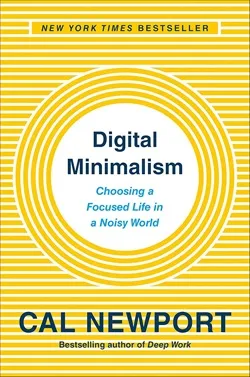
Cal Newport’s Digital Minimalism is a masterpiece piece of smart self-help that teaches readers new techniques for engaging with technology in meaningful, thoughtful ways. Although it was published in 2019–an epoch ago, given how quickly technology transforms–the insights the book offers are more important now than they ever were before.
Essentially, “digital minimalism” is a philosophy of how we use technology. The default philosophy for most of us, and I agree with Newport on this, is digital maximalism. That is, we use technology to gain the most of it, filling our phones and lives with low-quality, obsessive bloat for little nuggets of benefit. However, in the attention economy’s cut-throat competition, this actually makes life harder for us. At the core of Newport’s philosophy is the idea that we must choose which tools we want to use with intention, thinking closely about how each “feature” works in favor of the life we want to live.
I learned Newport’s lesson independently a bit over a year ago when the amount of low-level but incessant anxiety triggered by always being connected became unbearable. I unplugged from all social media for approximately a year and, in the past months, re-introduced a few helpful tools on my computer–not my phone! This has been enormously helpful to me and, while I find myself still pulled by distractions on my computer, they tend to be distractions of my own choosing, not pulls of dings, lights, and corporate-optimized dopamine hits.
The message here is simple but, given the digital ecosystem we inhabit, it is hard to put into practice. Newport, to his credit, puts forward clear, tangible, and really admirable strategies that can help even the most intense technology addict. For instance, the most helpful bit of the book is on how to cultivate quality leisure time. Six hours on Tik-Tok is obviously anything but quality leisure time. I don’t know about you, I gain effectively nothing form the platform, although I can see how some of the content acts as a trendy glue for those who are younger than me. I’ve passed the age where I need to keep up with these trends to maintain connections with my peers, so it’s best to avoid it at all. LinkedIn, on the other hand, offers low-quality “leisure,” but it is also a tool that I’ve learned to use with intention (no more aimless scrolling!).
For those who feel adrift in life–broadly speaking–Digital Minimalism will be a helpful book, as it offers a philosophy rooted in values, not trends. It’s a great book, a must-read for the 21st century.